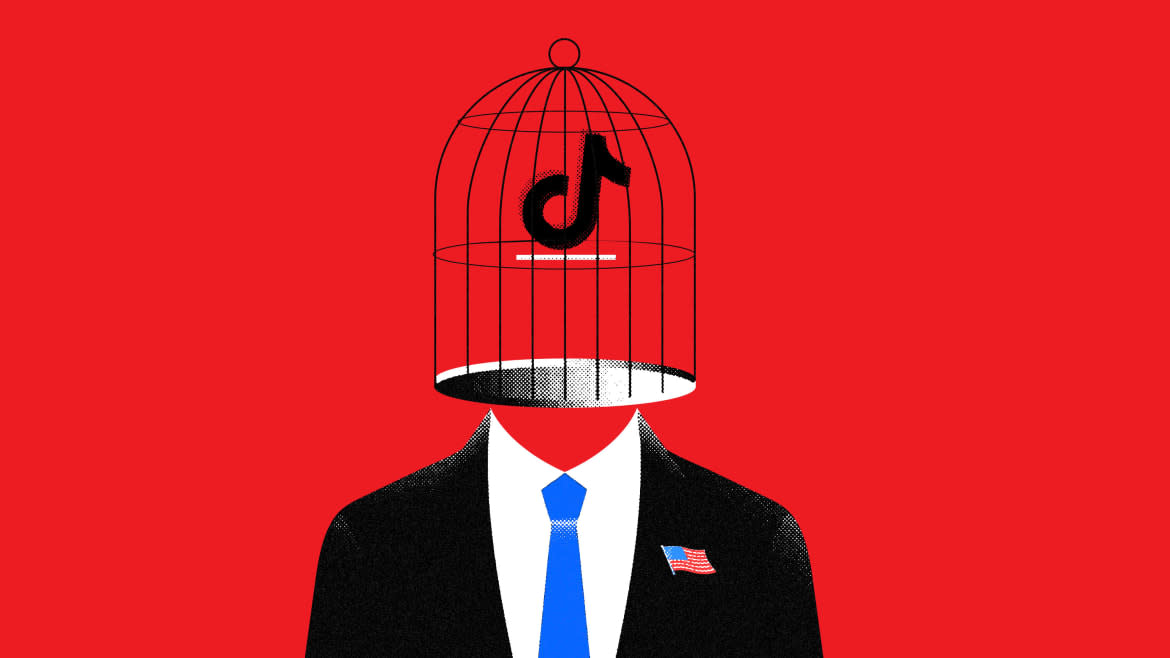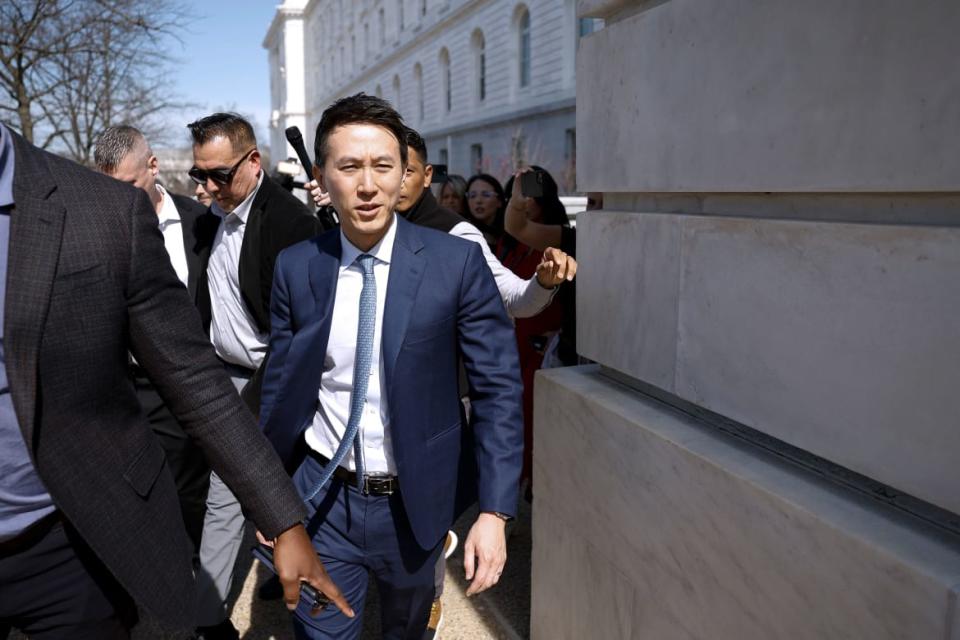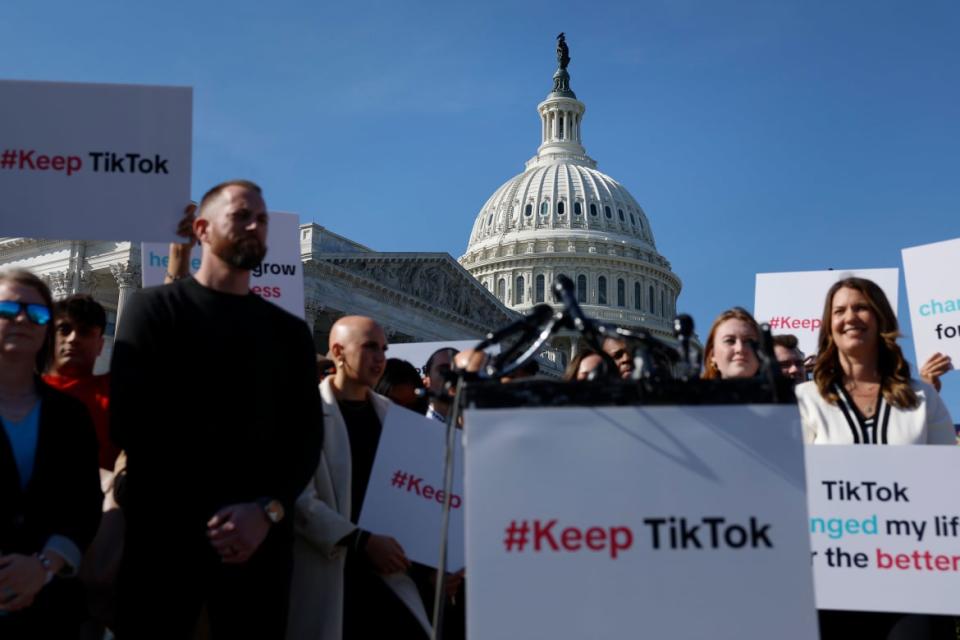TikTok Is Bad. Banning It Would Be Much Worse.

Americans tend to view bipartisanship favorably. But sometimes, when both parties get together and agree on something, it’s actually a sign that the public is about to get screwed over. Just look at the Patriot Act, for example, and the way the bipartisan post-9/11 law was used to spy on American citizens and violate our rights.
New proposed legislation that would enact a de facto ban on the popular social media platform TikTok is getting support from both sides of the aisle. This kind of government action is bipartisanship of the most toxic kind.
The “Protecting Americans from Foreign Adversary Controlled Applications Act” passed the House with an overwhelming bipartisan majority last week. It would, on paper, force TikTok’s parent company, Bytedance, to sell off its ownership stake. If it fails to do so, TikTok would be effectively banned in the U.S.
Elon Musk’s Feelings Led Him to Censor Legal Speech on X
The bill now heads to the Senate, where the FBI is holding briefings this week that advocates hope will help convince wavering members to pass it into law. (President Joe Biden has indicated that he will sign it into law, should the bill pass.)
So, the fate of one of the country’s most popular apps lies in the hands of the U.S. Senate. For the good of our country and to uphold Americans’ basic rights, they should kill this bill once and for all.
First, let’s be perfectly clear: This bill is, in practice, an outright ban on TikTok. Many of its apologists, like Sen. John Fetterman (D-PA), have claimed it’s not actually a ban, it simply forces China to divest from the company.
Let me be very clear: this legislation to restrict TikTok does NOT ban the app.
It separates ties to the Chinese Communist Party 🇨🇳 and prevents them from accessing the data of Americans—especially our kids.
Leader Schumer should put this bill on the floor soon.— John Fetterman (@JohnFetterman) March 13, 2024
This is a smokescreen. As The Washington Post has reported, the legislation only gives Bytedance six months to carry out the deal before TikTok is banned, yet completing a deal of this magnitude and complexity in that timeline is near-impossible. What’s more, even if it could somehow be done, China would almost certainly block the sale under its export controls for algorithmic technology.
It’s a ban. And you don’t have to take my word for it: In their press release announcing the legislation, several of the bill’s co-sponsors, including Reps. Chip Roy (R-TX) and Elise Stefanik (R-NY), specifically described it as a “ban” on TikTok.
Meanwhile, when TikTok pointed out that it’s a ban—not a forced sale—on Twitter, and accused members of Congress of hiding behind a false talking point, Rep. Dan Crenshaw (R-TEX) helpfully clarified, “No one is trying to disguise anything. We want to ban TikTok. You’re correct.”
No one is trying to disguise anything. We want to ban TikTok. You’re correct. https://t.co/tDqj74VLj8
— Dan Crenshaw (@DanCrenshawTX) March 5, 2024
So, if Congress is going to ban a popular app that 150 million Americans use, they should at least be upfront and honest about what they're doing. Instead, they’re covering their tracks with a smokescreen and spreading lots of other misinformation about TikTok, to boot.
The entire debate over banning TikTok is rife with claims that TikTok is “Chinese spyware” and “owned by the Chinese Communist Party (CCP).” But these claims range from overstated to outright untrue.
TikTok is not owned by the CCP. It is an international company with headquarters in the United States and Singapore. Its CEO, Shou Zi Chew, is a Singaporean based in Singapore, which, despite the apparent confusion of some members of Congress, is not part of China.
TikTok’s parent company is Bytedance, which is a global company—although it does have headquarters in Beijing. Despite the rhetoric, Bytedance is not a Chinese state enterprise. It is a private company founded by Chinese entrepreneurs.

Shou Zi Chew, CEO of TikTok, departs from the Russell Senate Office Building after meeting with Sen. John Fetterman (D-PA) on March 14, 2024.
However, global investors, including Americans, currently hold 60 percent ownership of Bytedance, while 20 percent of the company is owned by employees, which includes thousands of Americans. The remaining ownership is held by its Chinese founders. Even the five-person board of Bytedance has three Americans on it!
That said, in China, the line between private enterprise and the government is much blurrier than it is in the Western world. China’s authoritarian government can exert tremendous power over private companies under its national security laws.
So, the national security concerns over TikTok’s relationship with China aren’t without some merit. But they are routinely overblown, often overstated, and, at this point, purely hypothetical.
“U.S. intelligence has produced no evidence that the popular social media site has ever coordinated with Beijing,” The Intercept’s Ken Klippenstein reports. “In interviews and testimony to Congress about TikTok, leaders of the FBI, CIA, and the director of national intelligence have in fact been careful to qualify the national security threat posed by TikTok as purely hypothetical. With access to much of the government’s most sensitive intelligence, they are well placed to know.”
“There is no hard evidence that Chinese authorities have ever surveilled American data,” an analysis by the libertarian-leaning Cato Institute similarly concludes. “Even ban supporters themselves talk about surveillance as a future risk, not a current practice.”
The Hamas-Israel War Obliterated the Campus Microaggression
If the FBI’s latest briefings contain some sort of new information, the American public should be informed about it before drastic action is taken. Based on what we know now, this radical measure is being pushed through in the name of concerns that are, so far, completely hypothetical—not in response to any actual ongoing wrongdoing or danger.
This reality makes it impossible to justify the tremendous economic and social sacrifice that banning TikTok would entail.
This aspect often goes overlooked in this debate, but TikTok contributed more than $24 billion to the U.S. economy in 2023, according to Oxford Economics, supporting more than 224,000 jobs. Roughly seven million small businesses use TikTok and many rely on it for huge percentages of their revenue. Many of these American businesses would be ruined by a TikTok ban, not to mention the countless thousands of individual creators and entrepreneurs who have built a career on the platform who would lose everything—overnight.
So, too, a ban on TikTok would constitute one of the biggest infringements on Americans’ speech rights in modern history.

Participants hold signs in support of TikTok at a news conference outside the U.S. Capitol Building on March 12, 2024.
Supporters of the TikTok ban often argue that the “Chinese Communist Party has no First Amendment rights.” But that supposition entirely misses the point. The American owners of Bytedance do have rights, and TikTok’s millions of American users most certainly have a First Amendment right to communicate and express themselves on the platform.
Once again, you don’t have to take my word for it. The American Civil Liberties Union (ACLU) has come out swinging against the latest TikTok legislation and, in 2023, federal courts blocked the state of Montana’s attempt to ban TikTok on First Amendment grounds.
So, if the federal government enacts this TikTok ban, it will have to defend it in court, and meet the incredibly high legal bar known as “strict scrutiny” that applies to any government action that imperils First Amendment rights. For it to possibly be upheld under this standard, the government would need to prove not just that the ban serves a “compelling government interest” but also that its action is “narrowly tailored” to address that concern.
It seems impossible that the latter part of this requirement could ever be successfully defended in court, because there are many things the government could do short of a full ban on TikTok to address its concerns.
For example, the government can and should ban the use of TikTok on government devices and even prohibit government employees from using TikTok on their personal devices. It could also pass regulations forcing TikTok to enact data security measures and to provide more transparency with how it handles Americans’ data. But Congress is skipping straight to an outright ban, which sure seems unlikely to hold up as “narrowly tailored” in court.
The current legislation also applies to more than just TikTok. It gives the executive branch a new, perennial power to enforce this legislation against other apps or websites that are “controlled” (loosely defined in the legislation) by a “foreign adversary.” This is yet another strike against the bill.
Ron DeSantis’ Call to Deport Foreign Students Over Anti-Israel Views Is Un-American
Even if one supports banning TikTok, giving the executive branch the authority to take this kind of drastic action in the future without Congress is ripe for abuse and inconsistent with democratic principles. If the need arises in the future to ban another massive platform in the name of national security, the very least that Americans deserve is for their elected representatives to do their job and vote on it—so they can be held to account.
This is fundamentally a matter of principle, so it shouldn’t matter whether one loves TikTok or hates it.
No matter how elected officials personally feel about the app, this saga will be remembered as an inflection point for free speech in America—and senators should make sure that they’re on the right side of history.
Get the Daily Beast's biggest scoops and scandals delivered right to your inbox. Sign up now.
Stay informed and gain unlimited access to the Daily Beast's unmatched reporting. Subscribe now.

